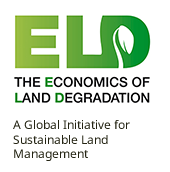Resource information
Land degradation and desertification reduce the provision of ecosystem services by lands and soils. This constrains development, reduces water, food, and energy security, and triggers resource conflicts. Although biophysical processes and economic impacts are increasingly understood, efforts to combat degradation have been failing thus far to prevent further losses of land productivity, a cost estimated at 42 billion USD/year (Dregne & Chou, 1992; Requier-Desjardins, 2007). The on-going global reduction of land will also be felt at regional and local scales, hindering further economic development, and further aggravating the poverty and vulnerability of the rural poor, who number 35 per cent of the world’s population and additionally rely most heavily on land for their survival, sustenance, and livelihoods. Driven by this issue and the need to address it, the Economics of Land Degradation (ELD) Initiative highlights the economic dimension of soil and land degradation in order to provide methods for valuing land accurately and thus enable its efficient and sustainable use. It promotes transdisciplinary approaches drawing from a range of scientific insights for informed decision-making and planning, and strives to highlight the economic potential of natural resource use to foster action and support investments in their sustainable use. Based on the capital asset framework, ecosystem service framework and ‘Total Economic Value’ framework, the methodological approach promoted by the Initiative can be applied at different scales and scopes, with the aim to achieve a more holistic assessment of the value of different land use options (Noel and Soussan, 2010; ELD Initiative, 2013) for all stakeholders. Evidence of the economic benefits of sustainable land management options have been compiled and summarised, and assessment results are being provided to three critical target groups: the private sector, scientific community, and policy-/decision-makers.



